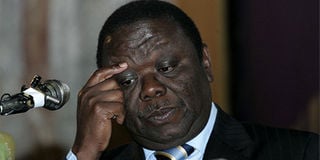Zimbabwe military chiefs still won’t salute premier

Zimbabwe Prime Minister Morgan Tsvangirai. As head of government, Mr Tsvangirai should be saluted by all the service heads including the head of army, General Constantine Chiwenga and the Commissioner General of police, Augustine Chihuri. Photo/REUTERS
HARARE, Sunday
Zimbabwe’s influential generals are still refusing to salute Prime Minister Morgan Tsvangirai six months after he joined President Robert Mugabe in a unity government, gesture analysts say shows an unwillingness to embrace change.
Almost two months before the first anniversary of the historic September 15 power sharing agreement, which gave Zimbabweans hope that the 85 year-old Mr Mugabe was being eased out of power, an unpalatable reality is beginning to sink in.
Since independence in 1980, the former guerilla leader has ruled with the support of a clique of army generals who have acquired enormous wealth such that dismantling their patronage system will come at a cost.
As head of government, Mr Tsvangirai should be saluted by all the service heads including the head of army, General Constantine Chiwenga and the Commissioner General of police, Augustine Chihuri.
The hope that Mr Tsvangirai’s ascendance to power will be smooth was mainly premised on the fact that his Movement for Democratic Change (MDC) had seized control of parliament from Zanu PF for the first time since independence.
But Mr Brilliant Mhlanga, a Zimbabwean academic based at the University of Westminister in the United Kingdom says the feat was a pyrrhic victory as demonstrated by the evolving political developments in the country.
And so much as the opposition has been boasting that they almost control parliament, it is useless, he said. Zanu PF has remained with the repressive state apparatus, defence forces and the judiciary. They have remained in control of all the levers of power to this day.
Repeatedly warned
The army generals who repeatedly warned before the formation of the unity government that they would not salute Mr Tsvangirai because they considered him a sell out are hugely influential.
They are part of the feared Joint Operations Command (JOC), which plotted Mr Mugabe’s fight back last year following his embarrassing electoral defeat by Mr Tsvangirai and are still rumoured to be in charge of policy formulation in government.
Mr Mugabe has also stubbornly refused to constitute a National Security Council that will replace JOC. The new body will include Mr Tsvangirai.
I would say their (generals) refusal to salute Tsvangirai is a clear case that he is not in power, Mr Mhlanga said. If he had power surely there is no way that those who breach that kind of protocol would go unpunished.
It means there is tacit approval also on the part of Mugabe otherwise failure to accept that fact is assuming that Mugabe is helpless and the generals are in control.
Although Mr Tsvangirai says it is not important for the generals to salute him because his priority was to end to his peoples suffering, his party continues to express unhappiness over the developments.
In the spirit of the inclusive government we expect that the service chiefs would follow in line with Mugabe’s working relationship, said MDC MP, Mr John Nyamande who recently demanded an answer from Defence Minister Emerson Mnangagwa.
What has surprised many of us is that they have’nt extended the same kind of respect and spirit of inclusiveness. That worries a lot of people. He is still waiting for an answer.
However, Mr Mhlanga says after realising over the years that the MDC was likely to dominate the legislature, Zanu PF politicised all other state organs and made parliament redundant.
Zimbabwe’s major state institutions and parastatals are run by former army generals who were in the forefront of the 1970 independence war where Mr Mugabe was one of the leading figures.
Mr Mhlanga adds: Mugabe is still very much in control and using these guys to protest. It is both a warning and safety device for him to have the generals doing whatever they are doing.
Dr Ibbo Mandaza, a former permanent secretary in Mr Mugabes previous administration says one of the reasons Zimbabwe’s transition has been slow is because the securocrats are resisting change.
He said the Zanu PF machinery had few people but held strategic positions within the pillars of the sate apparatus.
The agenda is driven essentially by self interest and self-preservation, as a class buttressed by a “securocracy” that had become so powerful over the last decade and now lacks the capacity to either unbundle itself or adjust quickly to the demands of the new dispensation, Dr Mandaza wrote in the Zimbabwe Independent newspaper.
Self-anointed as the usurpers of the history and ideology of liberation, these strategists sustain a disproportionate influence within the state, maintain the threat of violence as a major part of the arsenal the securocrats had monipolised over the decade.
However, he said it would be difficult for the backlash to be sustained indefinitely because the generals did not have an alternative to the GPA.
He said the situation was made difficult by the fact that the new dispensation came against a background of a Zimbabwean population so weary of a miserable past and yearning for a better future.




